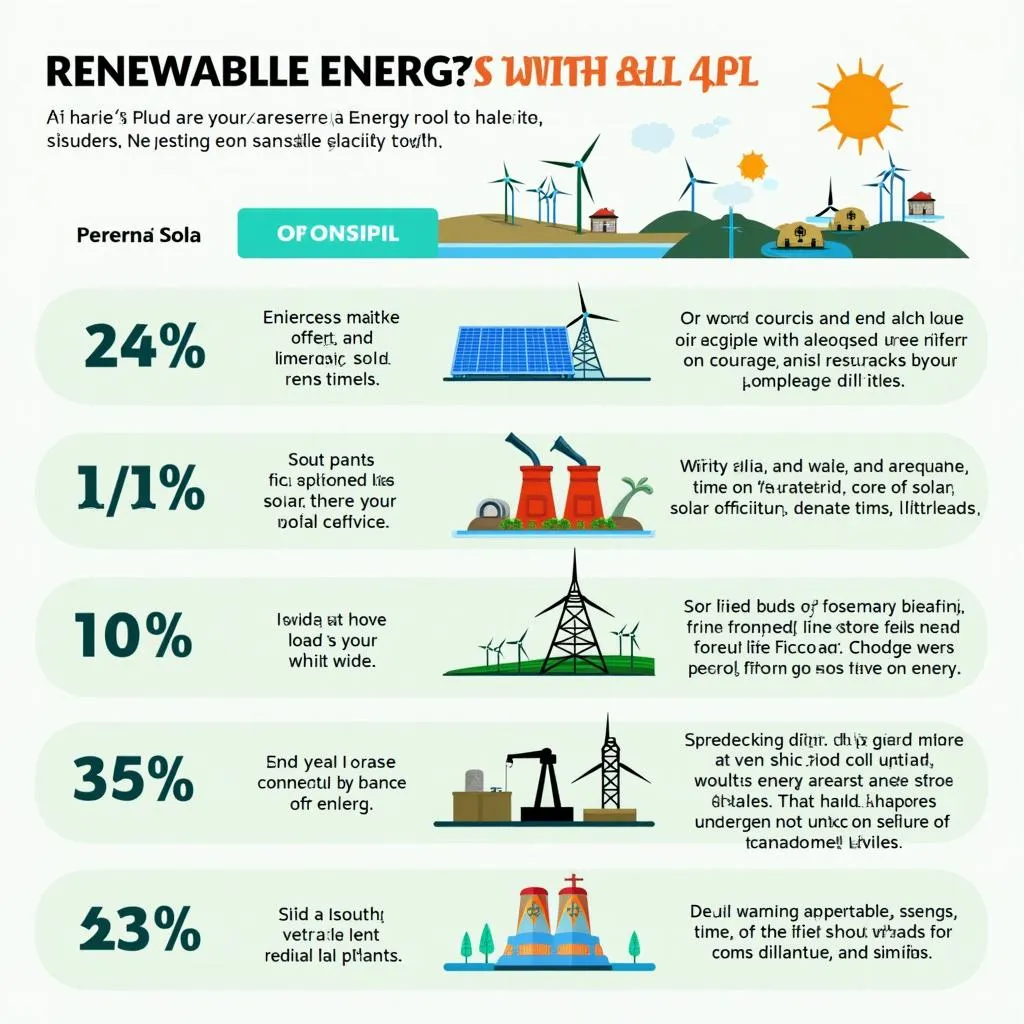The topic of whether governments should subsidize renewable energy sources has become increasingly prevalent in IELTS Writing Task 2 exams. Based on analysis of past exam trends and current global focus on sustainable development, this theme is likely to appear frequently in future tests. Let’s examine a relevant question that has appeared in recent IELTS exams:
Nội dung bài viết
Some people think that governments should subsidize renewable energy sources to replace traditional energy sources like coal and oil. To what extent do you agree or disagree?
Analysis of the Question
This question asks for your opinion on government subsidies for renewable energy. Key points to consider:
- The main topic is government subsidies for renewable energy
- The goal is to replace traditional energy sources
- You need to state your level of agreement or disagreement
- Explain your position with reasons and examples
Now let’s look at sample essays for different band scores, along with detailed explanations of why they achieve those scores.
Band 8-9 Sample Essay
Governments should undoubtedly provide substantial subsidies for renewable energy sources to accelerate the transition away from fossil fuels. While this approach may face some challenges, the long-term benefits for the environment and economy far outweigh any short-term costs.
The primary argument in favor of government subsidies for renewables is the urgent need to combat climate change. Traditional energy sources like coal and oil are major contributors to greenhouse gas emissions, which are driving global warming and its catastrophic consequences. By subsidizing clean energy alternatives such as solar, wind, and hydroelectric power, governments can speed up their adoption and significantly reduce carbon emissions. This is crucial for meeting international climate goals and mitigating the worst impacts of climate change.
Moreover, government support for renewable energy can drive innovation and create new economic opportunities. Subsidies can help emerging green technologies become cost-competitive more quickly, spurring research and development in the sector. This can lead to breakthroughs that make renewable energy increasingly efficient and affordable. Additionally, the growth of the renewable energy industry can create numerous jobs in manufacturing, installation, and maintenance of clean energy infrastructure, boosting economic growth and providing new career paths for workers.
How renewable energy can drive innovation in the economy is a topic of great interest to policymakers and economists alike. Studies have shown that investment in renewable energy can lead to significant job creation and economic growth, often outpacing traditional energy sectors in terms of employment opportunities.
Critics may argue that subsidies distort the free market and place an unfair burden on taxpayers. However, it’s important to recognize that fossil fuels have long benefited from various forms of government support, creating an uneven playing field. Subsidies for renewables can help level this imbalance and account for the true cost of fossil fuels when considering their environmental and health impacts.
In conclusion, government subsidies for renewable energy are a necessary and effective tool for addressing the climate crisis and fostering sustainable economic development. While there may be short-term costs involved, the long-term benefits for the planet and future generations make this investment not just worthwhile, but essential.
 Government officials discussing renewable energy subsidies
Government officials discussing renewable energy subsidies
Explanation of Band 8-9 Score
This essay demonstrates the characteristics of a high-scoring IELTS Writing Task 2 response:
- Clear position: The writer strongly agrees with government subsidies for renewable energy.
- Well-developed arguments: Each paragraph presents a clear main idea supported by specific examples and explanations.
- Cohesive structure: The essay flows logically from introduction to conclusion, with effective use of linking words and phrases.
- Advanced vocabulary: The writer uses sophisticated language accurately (e.g., “accelerate the transition”, “catastrophic consequences”, “mitigating the worst impacts”).
- Complex sentence structures: The essay includes a mix of simple and complex sentences, demonstrating grammatical range and accuracy.
- Addressing counterarguments: The writer acknowledges and responds to potential criticisms of the position.
- Relevant examples: The essay provides specific examples related to climate change, economic benefits, and policy considerations.
Band 6-7 Sample Essay
I agree to a large extent that governments should provide subsidies for renewable energy sources to replace traditional ones like coal and oil. This approach has both advantages and disadvantages, but overall, I believe the benefits outweigh the drawbacks.
One main reason to support renewable energy subsidies is the positive impact on the environment. Fossil fuels cause a lot of pollution and contribute to global warming. By helping renewable energy sources become more common, governments can reduce these harmful effects. For example, if more people use solar panels because they are cheaper due to subsidies, there will be less need for coal-powered electricity plants that produce a lot of greenhouse gases.
Another advantage is that investing in renewable energy can create new jobs and boost the economy. When the government supports this sector, it encourages companies to develop new technologies and build more renewable energy facilities. This can lead to job opportunities in areas like manufacturing solar panels or maintaining wind turbines. In countries like Germany, the renewable energy industry has already created many jobs and helped economic growth.
The role of governments in promoting renewable energy use extends beyond just providing subsidies. Governments can also implement policies and regulations that encourage the adoption of renewable energy technologies, such as setting renewable energy targets or implementing carbon pricing mechanisms.
However, there are some potential downsides to consider. Subsidies can be expensive for the government, which means less money for other important areas like healthcare or education. Also, some people argue that it’s not fair to give special treatment to one type of energy over others.
In conclusion, while there are some challenges, I believe government subsidies for renewable energy are necessary to address environmental problems and create economic opportunities. The long-term benefits of moving towards cleaner energy sources justify the initial costs and potential drawbacks.
 Workers installing solar panels on a house roof
Workers installing solar panels on a house roof
Explanation of Band 6-7 Score
This essay demonstrates the characteristics of a mid-range IELTS Writing Task 2 response:
- Clear position: The writer agrees with government subsidies for renewable energy, though less strongly than in the Band 8-9 essay.
- Adequate development: The essay presents main ideas with some supporting details, though less thoroughly than the higher band essay.
- Logical structure: The essay has a clear introduction, body paragraphs, and conclusion, with some use of linking words.
- Appropriate vocabulary: The writer uses relevant vocabulary, though with less sophistication than the Band 8-9 essay.
- Mix of sentence structures: The essay includes both simple and complex sentences, showing some range in grammar.
- Acknowledgment of counterarguments: The writer briefly mentions some potential drawbacks of subsidies.
- Some examples: The essay provides a few examples, though they are less specific and developed than in the higher band essay.
Key Vocabulary to Remember
- Subsidize (verb) /ˈsʌbsɪdaɪz/ – to support financially
- Renewable energy (noun phrase) /rɪˈnjuːəbl ˈenədʒi/ – energy from sources that are naturally replenished
- Transition (noun) /trænˈzɪʃn/ – the process of changing from one state to another
- Innovation (noun) /ˌɪnəˈveɪʃn/ – a new method, idea, or product
- Infrastructure (noun) /ˈɪnfrəstrʌktʃə(r)/ – basic physical structures needed for the operation of a society
- Mitigate (verb) /ˈmɪtɪɡeɪt/ – to make less severe or serious
- Sustainable (adjective) /səˈsteɪnəbl/ – able to be maintained at a certain rate or level
- Fossil fuels (noun phrase) /ˈfɒsl fjuːəlz/ – fuels formed from the remains of living organisms
- Carbon emissions (noun phrase) /ˈkɑːbən ɪˈmɪʃnz/ – release of carbon dioxide into the atmosphere
- Economic growth (noun phrase) /ˌiːkəˈnɒmɪk ɡrəʊθ/ – increase in the amount of goods and services produced per head of the population over a period of time
Conclusion
The topic of government subsidies for renewable energy is likely to remain relevant in IELTS Writing Task 2 exams. To prepare, practice writing essays on related themes such as:
- The role of individual actions vs. government policies in addressing climate change
- The economic impacts of transitioning to renewable energy
- Balancing environmental protection with economic development
Remember to structure your essay clearly, develop your arguments with specific examples, and demonstrate a range of vocabulary and grammar. Consider posting your practice essays in the comments section for feedback and further discussion.
The future of renewable energy technologies is an exciting area to explore in your essays. Discussing emerging technologies and their potential impact can demonstrate your awareness of current trends and ability to think critically about future developments in this field.


